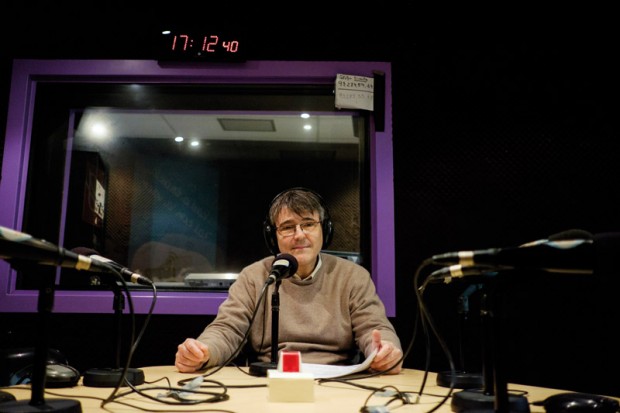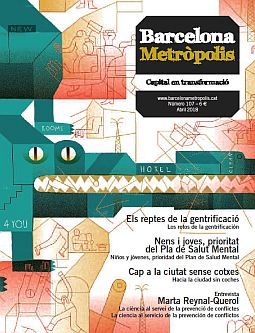One of every four Barcelonians has a mental health problem. The most common are anxiety and depression; of those that require hospitalization, the most common are bipolarity and schizophrenia. Many of these illnesses begin to appear during adolescence and are genetic in nature. This is the story of Xavier Martí (his real name), born in Barcelona in 1962, who suffers from paranoid schizophrenia. He started to experience episodes of this illness when he was in secondary school, and now he’s cared for by the Mentally Ill of Catalonia Foundation. These lines, in which Xavier summarizes his life, are a powerful testimony.

Xavier Martí at the Ràdio Gràcia facilities, where he has his own program every Thursday afternoon, from 6 to 7.
Photo: Arianna Giménez
“My father would say: ‘my son’s a poet.’ I’ve always liked to read and write. It’s my refuge. And I’ve gotten awards for my poems, even though I haven’t published anything. I was the most brilliant student at my school. It’s not me that says so, that’s what my teachers would say. When I made it to secondary school, I started to feel weird. My big brother, Martín, had already turned aggressive, already had some issues, and he turned against the family. Back then, I held on the best I could. But I suffered a lot. Then I had a self-referential episode, as they call it. Jesus Christ, the greatest exponent of Judeo-Christian tradition, came to see me at home.
Schizophrenia makes you distort things in your head. Still, it doesn’t make you lose all touch with reality, except when you’re in the acute phase; then, you see and hear things that aren’t there, and you get really scared. Trembling, I told my parents; they didn’t understand a thing. So I decided not to say anything. I kept it to myself. Even during military service. I knew that something wasn’t right and I went to talk with the doctor there, but he thought I was trying to get out of military service and he wouldn’t hear me out. People don’t understand you.
When I came back, I couldn’t take it anymore. One day I had a laughing attack and I couldn’t stop laughing. That was when they hospitalized me for the first time. When I got out, I accepted the worst kind of work. I wanted to write, I’m a poet, but the medication left me useless. I worked as a carpenter at a special work centre. I felt really bad. I thought about committing suicide. I tried to throw myself off the balcony at home. Then they changed my medication. All the tests said that I had great potential, but they sent me off to a job washing dishes. A really crappy job.
I have to hang on. I have to be strong. I have to hang on. Now it’s up to me to be a caretaker, for my mother and for Martín. My mother’s getting on in years, and I have to take her everywhere. Martín, who’s 63, suffers from chronic kidney failure and he has to be the centre of attention. He also has paranoid schizophrenia, and plus he’s in the early stages of dementia. I’ve never been aggressive like him, but I’ve been hospitalized twice, and he never has. Go figure.
I have another brother, Toni, who isn’t sick. He loves me a lot. If he sees I’m a little bit nervous, he asks me if I’ve taken my medication. It’s typical. But I can’t get angry, because those of us with a mental illness can’t get angry, because if we do it means we haven’t taken our medication. Toni’s had a really rough time with our situation at home. He’s cried a lot.
What does it matter if it’s genetic or not? At this stage in life… Plus, I won’t have children. But they’ve never analysed my genome. My father didn’t care what happened to me. It was like it was my fault. My mother still doesn’t understand it. For people of her generation, we nutcases aren’t normal people. Someone with cancer is a normal person. But someone with mental illness isn’t normal.
It’s like the judges, who say that I can’t decide who to vote for, as if I was a child. Can you believe it? When I read the court ruling that declared me incapacitated… For the love of God! That really hurt. Until then, I’d never gotten angry with psychiatry.
The second time I was hospitalized, it was like a liberation. That’s when I realized I had a problem; until then, I hadn’t accepted it. My father helped me get recognized as handicapped. I took printing courses at the Joia Foundation and I even worked in a copy shop for three years. Then, my father got cancer and he thought that someone would have to take care of us when he died. He put me in touch with the Mentally Ill of Catalonia Foundation, which takes care of us. They control our finances; they organize activities I participate in, like Christmas dinners, and every now and then I go and have a coffee with the Foundation’s caretakers, who also take me on trips to the doctor.
I like writing. I haven’t published anything, but I have lots of poetry collections. I’ve given writing classes at associations and civic centres, I’ve set up poetic creation workshops, writing workshops in general. Right now, I have four students at the neighbourhood Association of Coll-Vallcarca. I also collaborate with Ràdio Gràcia every Thursday afternoon from 6 to 7.
I used to have friends and even a girlfriend, a girl who loved me a lot and who I was really in love with. When she saw me again after military service, she didn’t want anything to do with me. She married someone else. I don’t want any more relationships with women, I don’t want to suffer. When my school friends started to see some of my issues, they called me crazy and stopped hanging out with me. Nutcase, they’d call me. It’s stigma. It hurts more than the disease itself.
I remember when I worked at a special carpentry centre; a psychiatrist would come and lecture us. He told us we had to get sterilized so we wouldn’t spread our disease. It’s like we have the plague!
Now, I’m depressed again. Like I haven’t been for years. I miss laughing. The political situation also affects me. ‘Xavi, what you’re thinking now, do you really feel it? Will you feel like this tomorrow morning?’, I keep asking myself. But I don’t want any more medication. So, after supper, even if it’s early, I put on the music I like, I take my pills, and I get in bed. I feel so tired…”




Enhorabona x la teva valentia. Gran persona gran Poeta. Ets un crack.